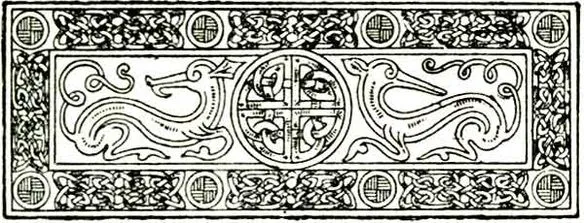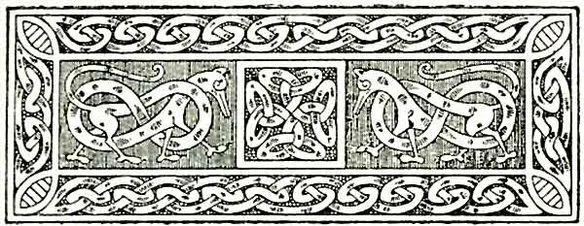The river was running very rapidly, so he was whirled away at a great rate; but he played as fast, ay, and faster, than the river ran; and though they set off as hard as they could along the bank, yet, as the river made a sudden turn round the hill, about a hundred yards below the bridge, by the time they got there he was out of sight, and no one ever laid eyes on him more; but the general opinion was that he went home with the pipes to his own relations, the good people, to make music for them.
FOOTNOTES.
[2] Car, a cart.

A FAIRY ENCHANTMENT
Story-teller—Michael Hart
Recorder—W. B. Yeats

n the times when we used to travel by canal I was coming down from Dublin. When we came to Mullingar the canal ended, and I began to walk, and stiff and fatigued I was after the slowness. I had some friends with me, and now and then we walked, now and then we rode in a cart. So on till we saw some girls milking a cow, and stopped to joke with them. After a while we asked them for a drink of milk. 'We have nothing to put it in here,' they said, 'but come to the house with us.' We went home with them and sat round the fire talking. After a while the others went, and left me, loath to stir from the good fire. I asked the girls for something to eat. There was a pot on the fire, and they took the meat out and put it on a plate and told me to eat only the meat that came from the head. When I had eaten, the girls went out and I did not see them again.
It grew darker and darker, and there I still sat, loath as ever to leave the good fire; and after a while two men came in, carrying between them a corpse. When I saw them I hid behind the door. Says one to the other, 'Who'll turn the spit?' Says the other, 'Michael Hart, come out of that and turn the meat!' I came out in a tremble and began turning the spit. 'Michael Hart,' says the one who spoke first, 'if you let it burn we will have to put you on the spit instead,' and on that they went out. I sat there trembling and turning the corpse until midnight. The men came again, and the one said it was burnt, and the other said it was done right, but having fallen out over it, they both said they would do me no harm that time; and sitting by the fire one of them cried out, 'Michael Hart, can you tell a story?' 'Never a one,' said I. On that he caught me by the shoulders and put me out like a shot.
It was a wild, blowing night; never in all my born days did I see such a night—the darkest night that ever came out of the heavens. I did not know where I was for the life of me. So when one of the men came after me and touched me on the shoulder with a 'Michael Hart, can you tell a story now?'—'I can,' says I. In he brought me, and, putting me by the fire, says 'Begin.' 'I have no story but the one,' says I, 'that I was sitting here, and that you two men brought in a corpse and put it on the spit and set me turning it.' 'That will do,' says he; 'you may go in there and lie down on the bed.' And in I went, nothing loath, and in the morning where was I but in the middle of a green field.

TEIGUE OF THE LEE
By Crofton Croker

can't stop in the house—I won't stop in it for all the money that is buried in the old castle of Carrigrohan. If ever there was such a thing in the world!—to be abused to my face night and day, and nobody to the fore doing it! and then, if I'm angry, to be laughed at with a great roaring ho, ho, ho! I won't stay in the house after to-night, if there was not another place in the country to put my head under.' This angry soliloquy was pronounced in the hall of the old manor-house of Carrigrohan by John Sheehan. John was a new servant; he had been only three days in the house, which had the character of being haunted, and in that short space of time he had been abused and laughed at by a voice which sounded as if a man spoke with his head in a cask; nor could he discover who was the speaker, or from whence the voice came. 'I'll not stop here,' said John; 'and that ends the matter.'
'Ho, ho, ho! be quiet, John Sheehan, or else worse will happen to you.'
John instantly ran to the hall window, as the words were evidently spoken by a person immediately outside, but no one was visible. He had scarcely placed his face at the pane of glass when he heard another loud 'Ho, ho, ho!' as if behind him in the hall; as quick as lightning he turned his head, but no living thing was to be seen.
'Ho, ho, ho, John!' shouted a voice that appeared to come from the lawn before the house: 'do you think you'll see Teigue?—oh, never! as long as you live! so leave alone looking after him, and mind your business; there's plenty of company to dinner from Cork to be here to-day, and 'tis time you had the cloth laid.'
'Lord bless us! there's more of it!—I'll never stay another day here,' repeated John.
'Hold your tongue, and stay where you are quietly, and play no tricks on Mr. Pratt, as you did on Mr. Jervois about the spoons.'
John Sheehan was confounded by this address from his invisible persecutor, but nevertheless he mustered courage enough to say, 'Who are you? come here, and let me see you, if you are a man'; but he received in reply only a laugh of unearthly derision, which was followed by a 'Good-bye—I'll watch you at dinner, John!'
'Lord between us and harm! this beats all! I'll watch you at dinner! maybe you will! 'tis the broad daylight, so 'tis no ghost; but this is a terrible place, and this is the last day I'll stay in it. How does he know about the spoons? if he tells it I'm a ruined man! there was no living soul could tell it to him but Tim Barrett, and he's far enough off in the wilds of Botany Bay now, so how could he know it? I can't tell for the world! But what's that I see there at the corner of the wall! 'tis not a man! oh, what a fool I am! 'tis only the old stump of a tree! But this is a shocking place—I'll never stop in it, for I'll leave the house to-morrow; the very look of it is enough to frighten any one.'
The mansion had certainly an air of desolation; it was situated in a lawn, which had nothing to break its uniform level save a few tufts of narcissuses and a couple of old trees coeval with the building. The house stood at a short distance from the road, it was upwards of a century old, and Time was doing his work upon it; its walls were weather-stained in all colours, its roof showed various white patches, it had no look of comfort; all was dim and dingy without, and within there was an air of gloom, of departed and departing greatness, which harmonised well with the exterior. It required all the exuberance of youth and of gaiety to remove the impression, almost amounting to awe, with which you trod the huge square hall, paced along the gallery which surrounded the hall, or explored the long rambling passages below stairs.
1 comment